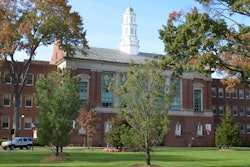WASHINGTON
The legacy of former U.S. Congressman Louis Stokes, D-Ohio, to help disadvantaged and minority students gain academic opportunities lives on in numerous federal government-funded science and engineering education activities and programs. This month, the nonprofit Council of Opportunity in Education (COE) establishes an entity that honors the former congressman with the launch of the Louis Stokes Institute for Opportunity in STEM (Science, Technology, Engineering and Mathematics) Education.
The Stokes Institute, which is based at the council’s Washington headquarters, will support research as well as curriculum and professional development to improve STEM education for low-income, first-generation and minority students. The institute will work directly with TRIO and other educational opportunity programs, colleges and universities, community organizations, and government agencies to help them implement STEM initiatives, according to officials.
“The institute will be concentrated upon a very targeted group of Americans. They will be low-income, disadvantaged and underrepresented minorities. Along with the concentration of trying to provide STEM education to those groups, which are currently underrepresented, (it) will also be trying to work on the national problem of getting qualified teachers for students in those specific areas,” Stokes says.
Kathryn Kailikole, the director of the Louis Stokes Institute, says she joined COE in October 2006 to lead the organization’s then newly-created office for STEM initiatives and it has since launched programs in five cities. As the chief advocacy organization for the nation’s federal TRIO programs, along with the 850,000 students served by those programs, COE recognized that the nonprofit could take a leading role in shaping STEM education for low-income, first-generation college-seeking, and minority students, Kailikole explains. Support to expand the STEM office into a full-fledged institute has come from the General Electric Foundation.
Says Stokes: “I’m just honored to have them name it after me … (The institute is) going to be under the overall leadership of (Dr.) Arnold Mitchem, who is the president of the Council of Opportunity in Education. He and I have had a long history with the TRIO programs, and I think there’s no better educational director in the country than Arnold Mitchem.”
Census and other data studied by Kailikole reveal that the STEM educational pipeline deeply narrows as students move toward and past their bachelor’s degrees. For example, out of every 10,000 low-income ninth-graders, just 30 complete college with bachelor’s degrees in STEM fields within five years. Kailikole estimates that of those original 10,000 low-income ninth-graders, only one or two pursue graduate degrees in a STEM field immediately after college.
“Despite the many well-intentioned public and private school-based and summer enrichment programs aimed at attracting and retaining low-income students in STEM fields, the results are extremely daunting,” she says.
Kailikole and the renowned University of Texas math educator, Dr. Uri Treisman, conducted on Wednesday a congressional briefing for legislators, staff and the public on Capitol Hill entitled “Seeking a Comprehensive Approach to STEM Learning: What are the Missing Pieces for Low-Income and Underrepresented Students.” Kailikole, a former student of Treisman, specializes in the intersection of mathematics, gender, language and cultural meaning and is soon expected to complete a doctorate in education at the University of California, San Diego.
“I understand and appreciate both the obvious and more subtle barriers to STEM education that confront and confound low-income students. Leading the Stokes Institute offers me the opportunity to develop and promote effective ways to overcome some of those barriers,” she says.
Click here to post and read comments
© Copyright 2005 by DiverseEducation.com


















